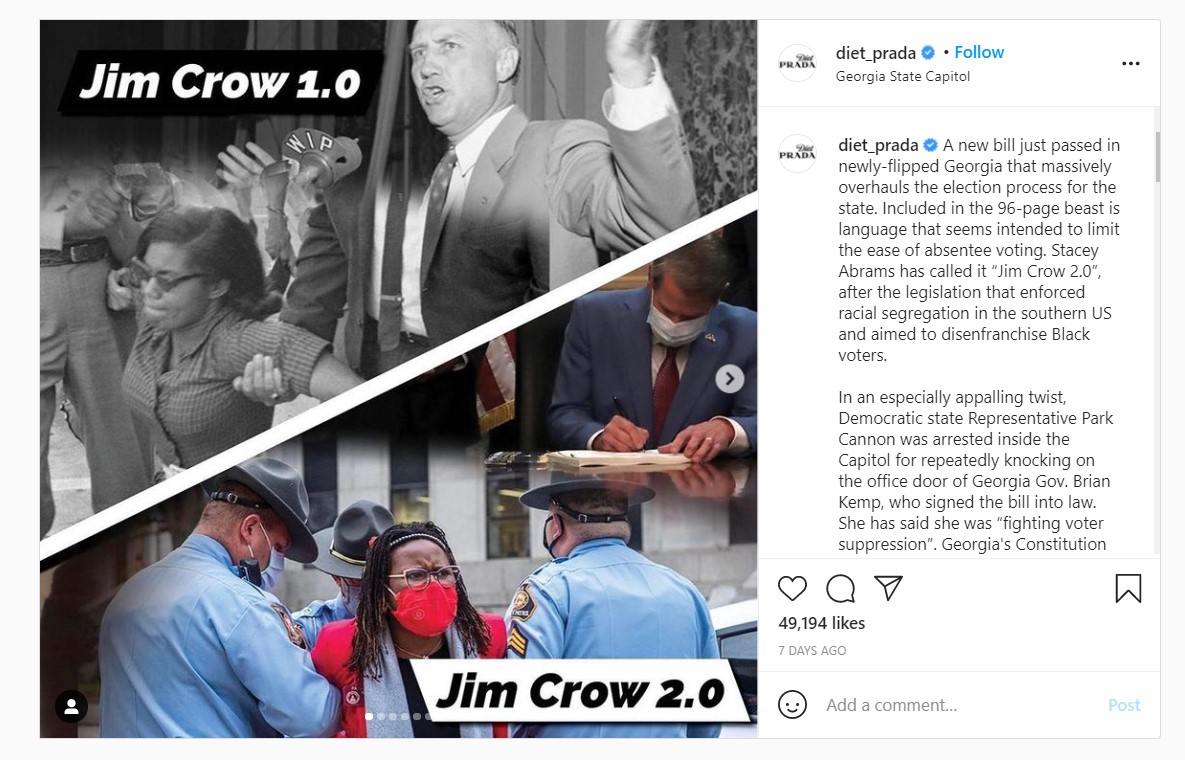Applying a lens of democracy — values, beliefs, practices — survey your social media streams to consider the forms and meanings of critical discourse by youth.
For this project, “critical” means critique of societal inequities, problems, and concerns of social conscience.

https://www.instagram.com/p/CM5B5YTFeb9/?igshid=19z8fdnw6t1qb
The guiding prompts below ask you to consider how these discourses are framed. How are varied levels of power/oppression — individual, cultural, institutional — discussed? In what ways, does critical discourse connect individual and cultural inequities to institutional levels of power and oppression?
Here’s some prompts; you needn’t address them all.
- What are some prominent issues and themes?
- Do certain intersectional levels of power — race, class, gender — receive greater attention? What’s not addressed?
- Who is articulating these messages?
- What is particularly compelling?
- What are different modalities/genres of critique, e.g. spoken word, memes, video enactments, musical performance, parody, what else?
- How do they integrate and dialogue with other texts, e.g. “news” from legacy-corporate media?
- Are there certain issues you follow?
- How are they framed?
- Does the discussion approach social concerns as issues facing individuals?
- Are systems of power addressed? Is there evidence of systemic thinking connecting different institutions and levels of power?
- Root causes discussed?
- Are alternatives proposed, root solutions outlined?
- Are strategies and movements for social change advanced?
- What do these varied messages say about the meanings of youth articulations — ideas, values, performances, visions — of democracy?
- How do you take in such messages?
- In what ways, if any, do they impact your thinking, feeling, being?
- Do you ever respond, engaging dialogue with online messages?
- Have any of these messages compelled you to real life action?
Steps
- Survey your regular social media streams to trace threads and themes of critical discourse by youth.
- Spend an hour and/or incorporate this survey into your daily social media diet.
- Keep an informal list of trending topics. Include this list at the bottom of the notes you will write as outlined below.
- Of all the social media content you take in, what percent do you estimate is critical discourse? Compared for example, to commercially-driven content.
- Select two issues/themes to write about and post.
- Search for topics about which you are especially concerned.
- In whatever online iteration they appear, e.g. Twitter post, upload these two to your rolling Google doc. This could be in the form of a screen shot.
- Keep a record of the URL for each.
- Of the two, select one to upload to the album class 19 youth critical discourse on the course Facebook page. Include a sentence or several describing the message and its meanings.
- Write several paragraphs responding to the above prompts. Approach it as a mini-essay to post on a blog or Instagram.
- Start with a strong opening sentence.
- Discuss some general findings.
- Discuss the two distinct issues/themes/iterations you selected. Identify the sources. You might include some discussion of the kind of responses it generated.
- Offer any new observations about online critical discourse that have come from doing this survey.
- Post to your rolling Google doc. Include assignment title, date. Send link to instructor.